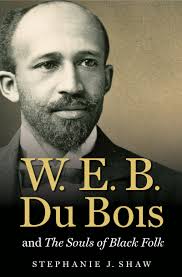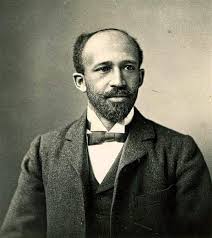The Souls of Black Folk Page #4
The Souls of Black Folk is a 1903 work of American literature by W. E. B. Du Bois. It is a seminal work in the history of sociology and a cornerstone of African-American literature. The book contains several essays on race, some of which the magazine Atlantic Monthly had previously published.
It is the aim of this essay to study the period of history from 1861 to 1872 so far as it relates to the American Negro. In effect, this tale of the dawn of Freedom is an account of that government of men called the Freedmen’s Bureau,—one of the most singular and interesting of the attempts made by a great nation to grapple with vast problems of race and social condition. The war has naught to do with slaves, cried Congress, the President, and the Nation; and yet no sooner had the armies, East and West, penetrated Virginia and Tennessee than fugitive slaves appeared within their lines. They came at night, when the flickering camp-fires shone like vast unsteady stars along the black horizon: old men and thin, with gray and tufted hair; women with frightened eyes, dragging whimpering hungry children; men and girls, stalwart and gaunt,—a horde of starving vagabonds, homeless, helpless, and pitiable, in their dark distress. Two methods of treating these newcomers seemed equally logical to opposite sorts of minds. Ben Butler, in Virginia, quickly declared slave property contraband of war, and put the fugitives to work; while Fremont, in Missouri, declared the slaves free under martial law. Butler’s action was approved, but Fremont’s was hastily countermanded, and his successor, Halleck, saw things differently. “Hereafter,” he commanded, “no slaves should be allowed to come into your lines at all; if any come without your knowledge, when owners call for them deliver them.” Such a policy was difficult to enforce; some of the black refugees declared themselves freemen, others showed that their masters had deserted them, and still others were captured with forts and plantations. Evidently, too, slaves were a source of strength to the Confederacy, and were being used as laborers and producers. “They constitute a military resource,” wrote Secretary Cameron, late in 1861; “and being such, that they should not be turned over to the enemy is too plain to discuss.” So gradually the tone of the army chiefs changed; Congress forbade the rendition of fugitives, and Butler’s “contrabands” were welcomed as military laborers. This complicated rather than solved the problem, for now the scattering fugitives became a steady stream, which flowed faster as the armies marched. Then the long-headed man with care-chiselled face who sat in the White House saw the inevitable, and emancipated the slaves of rebels on New Year’s, 1863. A month later Congress called earnestly for the Negro soldiers whom the act of July, 1862, had half grudgingly allowed to enlist. Thus the barriers were levelled and the deed was done. The stream of fugitives swelled to a flood, and anxious army officers kept inquiring: “What must be done with slaves, arriving almost daily? Are we to find food and shelter for women and children?” It was a Pierce of Boston who pointed out the way, and thus became in a sense the founder of the Freedmen’s Bureau. He was a firm friend of Secretary Chase; and when, in 1861, the care of slaves and abandoned lands devolved upon the Treasury officials, Pierce was specially detailed from the ranks to study the conditions. First, he cared for the refugees at Fortress Monroe; and then, after Sherman had captured Hilton Head, Pierce was sent there to found his Port Royal experiment of making free workingmen out of slaves. Before his experiment was barely started, however, the problem of the fugitives had assumed such proportions that it was taken from the hands of the over-burdened Treasury Department and given to the army officials. Already centres of massed freedmen were forming at Fortress Monroe, Washington, New Orleans, Vicksburg and Corinth, Columbus, Ky., and Cairo, Ill., as well as at Port Royal. Army chaplains found here new and fruitful fields; “superintendents of contrabands” multiplied, and some attempt at systematic work was made by enlisting the able-bodied men and giving work to the others. Then came the Freedmen’s Aid societies, born of the touching appeals from Pierce and from these other centres of distress. There was the American Missionary Association, sprung from the Amistad, and now full-grown for work; the various church organizations, the National Freedmen’s Relief Association, the American Freedmen’s Union, the Western Freedmen’s Aid Commission,—in all fifty or more active organizations, which sent clothes, money, school-books, and teachers southward. All they did was needed, for the destitution of the freedmen was often reported as “too appalling for belief,” and the situation was daily growing worse rather than better. And daily, too, it seemed more plain that this was no ordinary matter of temporary relief, but a national crisis; for here loomed a labor problem of vast dimensions. Masses of Negroes stood idle, or, if they worked spasmodically, were never sure of pay; and if perchance they received pay, squandered the new thing thoughtlessly. In these and other ways were camp-life and the new liberty demoralizing the freedmen. The broader economic organization thus clearly demanded sprang up here and there as accident and local conditions determined. Here it was that Pierce’s Port Royal plan of leased plantations and guided workmen pointed out the rough way. In Washington the military governor, at the urgent appeal of the superintendent, opened confiscated estates to the cultivation of the fugitives, and there in the shadow of the dome gathered black farm villages. General Dix gave over estates to the freedmen of Fortress Monroe, and so on, South and West. The government and benevolent societies furnished the means of cultivation, and the Negro turned again slowly to work. The systems of control, thus started, rapidly grew, here and there, into strange little governments, like that of General Banks in Louisiana, with its ninety thousand black subjects, its fifty thousand guided laborers, and its annual budget of one hundred thousand dollars and more. It made out four thousand pay-rolls a year, registered all freedmen, inquired into grievances and redressed them, laid and collected taxes, and established a system of public schools. So, too, Colonel Eaton, the superintendent of Tennessee and Arkansas, ruled over one hundred thousand freedmen, leased and cultivated seven thousand acres of cotton land, and fed ten thousand paupers a year. In South Carolina was General Saxton, with his deep interest in black folk. He succeeded Pierce and the Treasury officials, and sold forfeited estates, leased abandoned plantations, encouraged schools, and received from Sherman, after that terribly picturesque march to the sea, thousands of the wretched camp followers.
Translation
Translate and read this book in other languages:
Select another language:
- - Select -
- 简体中文 (Chinese - Simplified)
- 繁體中文 (Chinese - Traditional)
- Español (Spanish)
- Esperanto (Esperanto)
- 日本語 (Japanese)
- Português (Portuguese)
- Deutsch (German)
- العربية (Arabic)
- Français (French)
- Русский (Russian)
- ಕನ್ನಡ (Kannada)
- 한국어 (Korean)
- עברית (Hebrew)
- Gaeilge (Irish)
- Українська (Ukrainian)
- اردو (Urdu)
- Magyar (Hungarian)
- मानक हिन्दी (Hindi)
- Indonesia (Indonesian)
- Italiano (Italian)
- தமிழ் (Tamil)
- Türkçe (Turkish)
- తెలుగు (Telugu)
- ภาษาไทย (Thai)
- Tiếng Việt (Vietnamese)
- Čeština (Czech)
- Polski (Polish)
- Bahasa Indonesia (Indonesian)
- Românește (Romanian)
- Nederlands (Dutch)
- Ελληνικά (Greek)
- Latinum (Latin)
- Svenska (Swedish)
- Dansk (Danish)
- Suomi (Finnish)
- فارسی (Persian)
- ייִדיש (Yiddish)
- հայերեն (Armenian)
- Norsk (Norwegian)
- English (English)
Citation
Use the citation below to add this book to your bibliography:
Style:MLAChicagoAPA
"The Souls of Black Folk Books." Literature.com. STANDS4 LLC, 2025. Web. 22 Feb. 2025. <https://www.literature.com/book/the_souls_of_black_folk_310>.








Discuss this The Souls of Black Folk book with the community:
Report Comment
We're doing our best to make sure our content is useful, accurate and safe.
If by any chance you spot an inappropriate comment while navigating through our website please use this form to let us know, and we'll take care of it shortly.
Attachment
You need to be logged in to favorite.
Log In